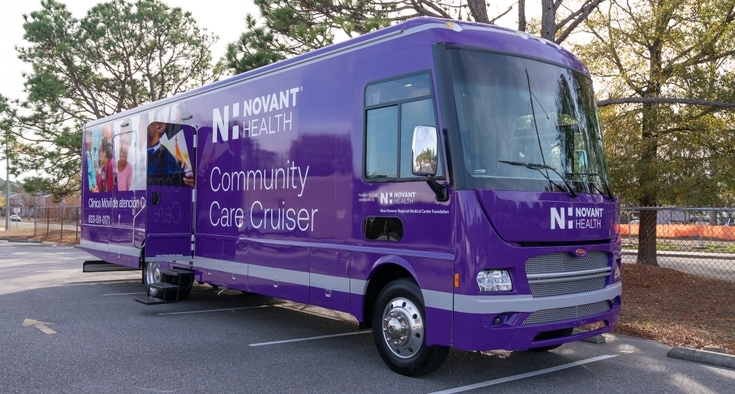Wilmington’s First Community Care Cruiser Takes to the Streets
It’s part of Novant Health’s commitment to removing barriers to health care.

“Keep your eyes peeled for the big, purple bus – it’s like a big, purple hug.”
That’s advice from Elizabeth Forte, the transcultural health manager at Novant Health New Hanover Regional Medical Center, on how to spot Wilmington’s first Community Care Cruiser. The cruiser is a 38-foot mobile health unit that will help to bring health care to community members right where they are, creating a new avenue of care for those who need it.
The mobile cruiser will provide a variety of health and medical services, including preventive screenings, prescriptions, rapid tests for illnesses like RSV and flu, vaccines, nutrition counseling and more. It’s an important part of Novant Health’s commitment to ensuring all community members receive the care they need, regardless of where they live, income or circumstances.

“We’re planning to be intentional and creative about where we take the cruiser to remove barriers patients may face when trying to access care,” Forte said.
The cruiser will travel to community health events, schools and other gathering places in the Cape Fear region. It will also provide primary care each Wednesday from 9 a.m. to 3 p.m. in the parking lot of the Wilmington branch of the Food Bank of Central and Eastern North Carolina, located downtown at 1000 Greenfield St., and an appointment is not required during this time.
Establishing Continuity of Care
A big change the Community Cruiser stands to make in the community is allowing families who don’t have a regular, stable relationship with a doctor to establish one. Clinicians aboard the cruiser will provide primary care services and can also help to connect individuals and families with a primary care doctor at a nearby clinic location.
For individuals who don’t regularly visit a doctor for routine care, small health concerns can escalate into larger problems when they go untreated. And that can often result in a preventable visit to the emergency room. Establishing a relationship with a primary care provider allows the doctor to screen, diagnose and form a care plan for small health issues before they become big emergencies.
“We understand that patients may delay or avoid care for a number of reasons, so we’re delighted that the cruiser reduces barriers related to access, cost, and convenience,” Forte said. “Reliable and consistent healthcare gives community members, their children and their families more stability.”
While this is Wilmington’s first Community Care Cruiser, Novant Health already operates cruisers in the Charlotte and Winston-Salem regions, where care team members have helped patients manage high blood pressure, diabetes, mental health conditions like anxiety and depression, and much more.
Cruiser care team members will also work to connect patients with additional health resources when needed. Patients will be able to receive a referral to a Novant Health specialist, talk with a financial liaison, receive assistance with food insecurity, and/or be connected with a social worker. Patients will also have access to an interpreter, if needed.

“It’s really about caring for the whole person,” said Dr. Emilia Parrott, a family medicine doctor who will be providing primary care in the Community Care Cruiser. “I’m excited to give the community medical care, to increase access and to build long-term relationships with people.”
In the future, Parrott will see patients at the new Novant Health Michael Jordan Family Clinic, now under construction on Greenfield Street in Wilmington, across the street from the Houston Moore neighborhood.
There’s a second Community Care Cruiser on the way later in 2024, as well as a second Novant Health Michael Jordan Family Clinic, the next one located just yards away from the Creekwood South community. It’s all part of Novant Health’s commitment to closing health equity gaps and addressing social determinants of health.
“You spoke, we listened,” Forte said.